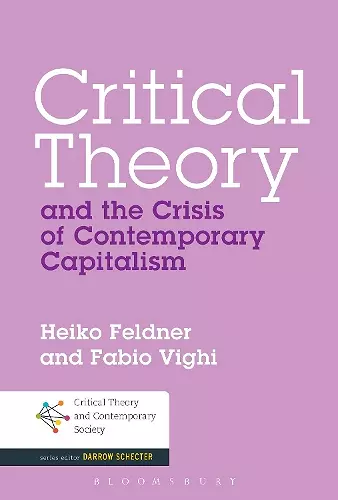Critical Theory and the Crisis of Contemporary Capitalism
Dr Fabio Vighi author Heiko Feldner author
Format:Hardback
Publisher:Bloomsbury Publishing PLC
Published:18th Jun '15
Currently unavailable, and unfortunately no date known when it will be back

This Critical Theory and Contemporary Society volume reassesses the economic crisis through Marx's theory of the value-form as the unconscious matrix of modern society.
This volume reassesses the nature of the current global economic crisis and its implication for the 21st century, through the unique lens of Marx's theory of the value-form as the unconscious matrix of modern society.
Going beyond orthodox Marxist and postmodernist accounts, the author offers fresh new readings of Marx, Benjamin, Foucault, and Žižek. Here he argues that capitalism has not only entered its greatest crisis since WWII, but has in fact reached its historical limit and is in terminal decline. In this light, the book seeks to answer how a rerun of Keynesian regulations could possibly resolve the crisis. It also inquires as to whether a Green New Deal might succeed when the gap between work to be had and work to be done widens, and what alternatives neo-Marxian approaches offer considering the failure of Marxism in the 20th century.
This far-reaching, critical examination of the crisis not only builds on critical theory, but also offers new readings of key theorists that will appeal to anyone interested in political theory, critical theory, and political economy.
Feldner's and Vighi's new book is what we have all been waiting for — in its diagnosis of the ongoing economic and financial crisis it combines in a masterful way concrete economic analysis with a philosophical and cultural interpretation of today's world. Only such an approach which deals with Alan Greenspan AND Giorgio Agamben will do the work. This is why Critical Theory and the Crisis of Contemporary Capitalism is a book for everyone who wants to understand the predicament we are all in — in short, for everyone who still cultivates a desire to think. * Slavoj Žižek, International Director of the Birkbeck Institute for the Humanities, Birkbeck, University of London, UK *
Heiko Feldner and Fabio Vighi use and link two different approaches — Marxian and Lacanian — to analyze the present global crisis. The theoretical connection between a Marxist and a Lacanian approach to the crisis of contemporary capitalism is Žižek, who becomes the methodological and theoretical reference point of the two authors. They compare the most recent studies and discuss the theses of Agamben in order to criticize the theological-political dispositif. The analytical part of the book is very interesting and useful because it allows us to understand the mechanisms of power and control in both the political and economic field and in psychology with the reduction of experience in language and with the control mechanisms of language. They mean that social antagonism and alienation are irreducible aspects of our social being therefore it is nothing to be liberated. The authors know very well as the writings of Marx and those of Lacan and debate with the criticism of recent years as well with philosophical positions of recent past. Simply put, the analysis of the economic, social and psychological crisis contained in this book serves then to clarify what is happening in today society and economy and even in psychology of ego, to understand the mechanisms of politic power and social domination as well of language domination. * Mauro Ponzi, Professor of German Literature, Sapienza University of Rome, Italy *
Anyone interested in the ongoing global economic crisis will read this volume with great benefit and fascination. Drawing on highly original readings of a range of left-wing political thinkers from Karl Marx to Slavoj Žižek, Heiko Feldner and Fabio Vighi argue that an intelligently re-thought neo-Marxism might have a lot to offer in the current predicament. Not everyone will agree, but no one can fail to be intrigued by their theoretical take on the crisis. * Stefan Berger, Director of the Institute of Social Movements, Ruhr University of Bochum, Germany *
ISBN: 9781441189097
Dimensions: unknown
Weight: 386g
160 pages